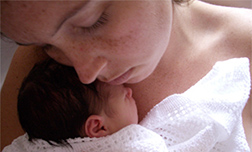Reproduction Later in Life is a Marker for Longevity in Women.
Women who are able to naturally have children later in life tend to live longer, and the genetic variants that allow them to do so also might facilitate exceptionally long life spans, according to a new study co-authored by a team of BU School of Public Health biostatisticians.

The study, led by BU School of Medicine researchers and published in Menopause: The Journal of the North American Menopause Society, says women who are able to have children after the age of 33 have a greater chance of living longer than women who had their last child before the age of 30.
“Of course, this does not mean women should wait to have children at older ages in order to improve their own chances of living longer,” explained Dr. Thomas Perls, the corresponding author and a professor of medicine at BUSM. “The age at last childbirth can be a rate of aging indicator. The natural ability to have a child at an older age likely indicates that a woman’s reproductive system is aging slowly, and therefore so is the rest of her body.”
The study was based on analyses of data from the Long Life Family Study (LLFS)—a biopsychosocial and genetic study of 551 families with many members living to exceptionally old ages. Boston Medical Center is one of four study centers that make up the LLFS.
The study investigators determined the ages at which 462 women had their last child, and how old those women lived to be. The researchers found that women who had their last child after the age of 33 had twice the odds of living to 95 or older, compared with women who had their last child by age 29.
The findings also indicate that women may be the driving force behind the evolution of genetic variants that slow aging and decrease risk for age-related genes, which help people live to extreme old age, the researchers said.
The study results are consistent with other findings on the relationship between maternal age at the birth of the last child and exceptional longevity. Previous studies have found that women who gave birth to a child after the age of 40 were four times more likely to live to 100 than women who had their last child at a younger age.
Co-authors on the study include: Fangui Sun, Paola Sebastiani, Harold Bae and Avery McIntosh, all from the biostatistics department. Also contributing were researchers from the Mailman School of Public Health, Washington University and the University of Pennsylvania.
The Long Life Family Study is funded by the U.S. National Institute on Aging/National Institutes of Health.